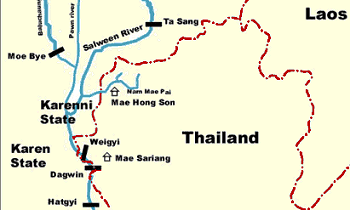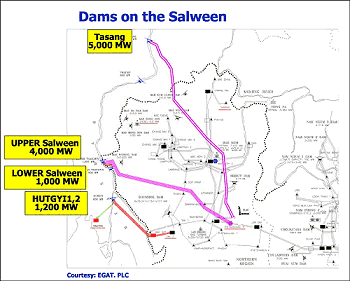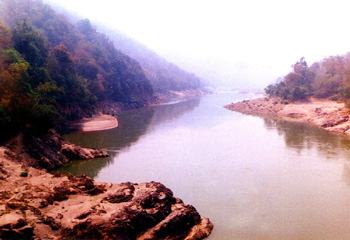Burma (Myanmar) - Salween Dams
Salween dams day of action Sept. 21
Global Call to Action Against the Salween Dams in Burma
On September 21, 2006 join activists from around the world Stand up in solidarity with Burma's victims of severe and systematic human rights violations and environmental destruction
Protest against the Thai government's plans with the Burmese military dictatorship to dam the Salween River in Burma Join us and gather outside your Thai embassy or consulate to call for the complete halt of the dam plans on the Salween River, where:
- Civil War is raging in the area around the dam sites and hundreds of thousands of people have been displaced at gunpoint
- Dams are being used as a military strategy against the ethnic peoples of Burma
- Torture, rape, and killings of villagers are continuing as more soldiers are being deployed and more landmines laid
- Dams will provide financial support to the military junta
- Massive corruption is inevitable given the complete lack of transparency
- The dams will permanently degrade Southeast Asia's longest free flowing river's fisheries, floodplains, teak forests and wildlife habitats, and flood villages and fertile agricultural land
What Can You Do?
- Demonstrate in front of your local Thai Embassy/Consulate on September 21, 2006
- Contact your Thai embassy and share your concerns
- Sign the petition letter attached and/or sign online at (http://www.petitiononline.com/9202006/petition.html)
- Encourage others to sign the petition and participate in the action
- Hold roundtable talks, meetings, and letter writing parties to take future action
Petition letter
20 September 2006
Subject: Please review plans to cooperate with the Burmese military regime for the construction of hydropower dams on the Salween River
Dear Caretaker Prime Minister of Thailand,
Cc: Minister of Energy and Governor of Electricity Generating Authority of Thailand (EGAT)
We, the individuals and organizations from Burma, Thailand, and other countries listed below, are gravely concerned about the likely environmental and social impacts from hydropower projects on the Salween River, a joint-project between the Thai and Burmese governments, the Chinese state-owned Sinohydro Corporation, and Thailand based MDX subsidiaries. If the dams are built, ecological integrity, human security, and local livelihoods will be jeopardized. Therefore, we call for the Thai government and concerned agencies, including the Ministry of Energy and EGAT, to review and withdraw from the projects for the following reasons:
Lack of transparency in the decision-making process
The entire decision-making process for the planning of the Salween hydropower development projects has been shrouded in secrecy. There has been a total absence of public participation among the dam-affected communities in Burma already suffering the atrocities of civil war, or the over fifty ethnic Thai-Karen villages living along the Salween River in Thailand's Mae Hong Son province.
The Memorandum of Understanding (MoU) between the Thai Ministry of Energy and Burma's Ministry of Electric Power was signed in May 2005 for the development of five hydropower projects on the Salween and Tanaosri river basins. Then in December 2005, a Memorandum of Agreement (MoA) was signed for joint-investment and implementation of the Hutgyi dam construction between EGAT Plc and Burma's Department of Hydropower stating that the construction would commence in late 2007. Recently, in June 2006, EGAT and Sinohydro Corporation, a state enterprise from the People's Republic of China signed an MoU for the development of the Hutgyi dam.
Violation of international good governance principles
The planned Salween hydropower projects has been conceived on double standards and loopholes to avoid compliance with relevant environmental laws in Thailand, as follows for the Hut Gyi dam case:
1. As a state enterprise, EGAT is strongly urged to maintain its good standards of practice for projects implemented in Thailand in other countries. This includes the compliance with the current Thai Constitution and other relevant laws and regulations. The following laws and regulations are currently being violated in the planning process for the Salween dams: complete disclosure of project information to the public; hearing process to receive input from as many groups of affected people as possible; and the official public hearing of the Environmental and Social Impact Assessment report and the review and approval process of such report as required by the Thai Enhancement and Conservation of the Environmental Quality Act B.E. 2535 (1992).
Specifically, the MoU's and MoA's go against articles 46, 58, 59, and 60 of the 1997 Thai Constitution, and the 1997 Official Information Act of Thailand. Article 46 states - Thai citizens have the right to "participate in the management, maintenance, preservation and exploitation of natural resources and the environment"; and Article 59 states "A person shall have rights to receive information, explanation and reasons from state agencies before the government gives permission for any project that could affect the quality of the environment or life." In addition, the reservoir caused by the Hutgyi dam construction will obviously distort the expanse of the Salween River, which is being used as the demarcation line between Thailand and Burma, and thus may lead to geopolitical conflicts in the future.
2. It remains unclear whether the MoA's signed by EGAT Plc. remain valid and legally binding given the reinstatement of the status of EGAT to be a state enterprise. At the time of signing the MoA with Burma's Department of Hydropower in December 2006, EGAT was still declared as a public company. Yet, there was a consequent ruling from the Supreme Administrative Court of Thailand later the same month to revoke legal foundation for the privatization of EGAT.
Amidst this ambiguity, EGAT rushed to sign another deal, the MOA for the study and development of hydropower of the Hutgy Dam with the Sinohydro from PRC. Such an impetuous effort may give rise to international conflict in the future if the contract is later found invalid and not legally binding due to the ruling for revocation of the listed status of EGAT.
Funding brutal suppression by the Burmese junta against ethnic groups in Burma
Notorious for its severe human rights violations, the Burmese junta over the past many decades has been attempting to wipe out entire ethnic groups in various parts of the country. This has included the burning and looting of villages in ethnic areas, forced relocation and forced labor, systematic rape, extra judicial killings, and ongoing wars waged against armed ethnic minority groups and civilians. At least 540,000 people inside Burma have been displaced and many more have fled across the Thai border, or taken refuge along the border. It is estimated that more than 140,000 people in Burma will be removed from their land due to the many development projects along the Thailand-Burma border, including the Hutgyi Dam. This initial one billion dollar joint-investment with the Burmese junta will provide them with more military resources for the Burmese Army to enable further conquest in ethnic areas, which will contribute to further human rights violations in the country.
Thailand stands accused of supporting the Burmese junta by continuing to make business deals with the military junta despite the regime's grave human rights violations. In addition, Thailand has to bear the cost of increasing waves of refugees who seek shelter in Thailand.as their villages are burned by the junta and/or flooded by the dams. They will have no home to return to should the hydropower projects on the Salween River materialize.
For these reasons, the Thai government should stop this hydropower project as it directly aids the Burmese regime's ability to consolidate their grip of power over contested ethnic territory during a war, at the expense of the environment and further suffering of ethnic peoples.
A High Risk Investment
All the proposed sites for dam construction on the Salween River are situated within areas of ongoing civil war. For example, the Hutgyi dam site is located in an area with thousands of land mines and unexploded ordnances (UXO). In fact, EGAT lost one of its employees to a landmine in May 2006 during a survey of the site for the construction of Hutgyi Dam. The incidence attests to the lack of security and the volatile situation in the area. It is not reasonable or acceptable for EGAT to risk the life of its personnel for this project.
Highly distorted energy forecast of Thai energy planning agency
Previous energy demand forecasts in Thailand have been subject to unacceptable levels of inaccuracy, particularly regarding the tendency to overestimate the energy demand by simply pegging the figures on the over-forecasted economic growth rate. Taking the latest Power Development Plan issued last April for the next 10-15 years, the projection of energy demand already exceeds the actual demand by at least 900 megawatts. Therefore, power development planning needs to be subject to scrutiny and input from other stakeholder groups to ensure more accurate estimates of power demand. We call for a more accurate power forecast, effective demand-sided management, increased efficiency in electricity utilization, and consideration of alternative and renewable sources of fuels, all of which would more accurately assess the necessity for construction of the Salween dams.
A plea for stopping the projects
The undersigned below requests the Caretaker Prime Minister Thaksin and relevant agencies to withdraw from all the planned hydropower projects on the Salween River in cooperation with the Burmese junta.
We sincerely hope the Caretaker Prime Minister shall take the suffering of people in neighboring countries into account just as you would your own people's suffering and realize the immense environmental and social damage that will not just affect the two countries, but the whole region. The withdrawal of these hydropower project plans on the Salween River will elevate Thailand to be recognized as one of the most prudent and responsible leaderships in the region as well with the international community.
In good faith and respect,
Signed by civil society organizations from various countries
burma | dams | www.agp.org
 Salween protestors shatter MDX public relations facade (21/11/2007)
Salween protestors shatter MDX public relations facade (21/11/2007)
 burma rivers network (6/10/2007)
burma rivers network (6/10/2007)
 The human cost of damming in Burma (12/9/2007)
The human cost of damming in Burma (12/9/2007)
 Ta Sang: a weapon of war (September 2007)
Ta Sang: a weapon of war (September 2007)
 Thai EGAT Team Discuss Dam Project with KNU (23/8/2007)
Thai EGAT Team Discuss Dam Project with KNU (23/8/2007)
 Atrocity before the Deluge (8/7/2007)
Atrocity before the Deluge (8/7/2007)
 Villagers want end of Salween dams (28/2/2007)
Villagers want end of Salween dams (28/2/2007)
 Salween Dams Would Displace Thousands, Activist Warns (28/2/2007)
Salween Dams Would Displace Thousands, Activist Warns (28/2/2007)
 Protest against Salween projects (28/2/2007)
Protest against Salween projects (28/2/2007)
 Stop Damnable Damming of Salween River (28/2/2007)
Stop Damnable Damming of Salween River (28/2/2007)
 Protest in Canada Against Salween Dams (28/2/2007)
Protest in Canada Against Salween Dams (28/2/2007)
 Protest in Japan Against Salween Dams (28/2/2007)
Protest in Japan Against Salween Dams (28/2/2007)
 Protest in India Against Salween Dams (28/2/2007)
Protest in India Against Salween Dams (28/2/2007)
 salween dams global day 2/28 (15/2/2007)
salween dams global day 2/28 (15/2/2007)
 Thailand and Myanmar at Odds over Salween Dams (13/12/2006)
Thailand and Myanmar at Odds over Salween Dams (13/12/2006)
 Floods Cause Havoc Across Burma (12/10/2006)
Floods Cause Havoc Across Burma (12/10/2006)


